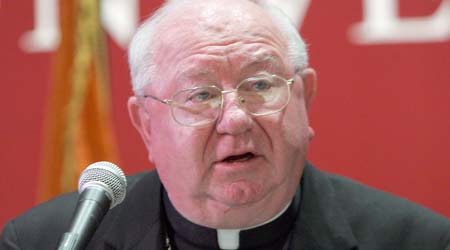The Bishops Weigh In On The Bailout
In a letter sent to Congressional leaders on September 26, 2008, Bishop William Murphy of Rockville Centre, NY, chairman of the episcopal conference’s Committee on Domestic Justice and Human Development, urged a consideration of five key principles when considering how to bail out the nation’s failing economy. 
The first key Bishop Murphy encouraged was taking into account the “human and moral dimensions” of the crisis.
“Economic arrangements, structures and remedies should have as a fundamental purpose safeguarding human life and dignity,” he affirmed. Murphy said a “scandalous search for excessive economic rewards,” is an example of “an economic ethic that places economic gain above all other values.”
“This ignores the impact of economic decisions on the lives of real people as well as the ethical dimension of the choices we make and the moral responsibility we have for their effect on people,” Bishop Murphy wrote.
He called for responsibility and accountability.
“Clearly, effective measures are required which address and alter the behaviors, practices and misjudgements that led to this crisis…Those who directly contributed tothis crisis or have profited from it should not be rewarded or escape accountability for the harm they have done,” he said.
“There are human needs which find no place on the market,” Murphy stressed. “It is a strict duty of justice and truth not to allow fundamental human needs to remain unsatisfied.” In this regard, he called for a “renewal of instruments of monitoring and corection within economic institutions and the financial industry as well as effective public regulation and protection to the extent this may be clearly necessary.”
Bishop Murphy’s Diocese of Rockville Centre is based on Long Island. Many of his flock, myself included, work in New York or for people who commute there. Long Islanders have been particularly walloped by the Wall Street meltdown.
It’s stunning just how fast and how deep this collapse is, racing around the world to batter everyone’s economy.
This crisis has created a teachable moment for the bishops – what can happen in an ethics vacuum, and how we are all interconnected.
Any decline in the financial industry has ripple effects across the region, said Jesuit Fr. James Martin, associate editor of America magazine. Before his ordination, Fr. Martin worked in corporate finance with General Electric.
“It’s more a symptom of environments where people seem much more interested in making money than in making sensible decisions,” he said. Senior executives made “obscene amounts of money making bad investments,” he said, and there were no incentives not to continue.
“They were carried away by greed and that trumped rational responsibility. They should have known better.”
